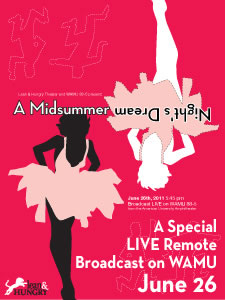A Midsummer Night’s Dream
To See a Voice and Hear a Face
With Fairy Magic and Bottom’s Roar
Lean & Hungry Theater, WAMU 88.5 FM Radio, Washington, D.C.
Sunday, June 26, 2011
Directed by Hannah Todd
 It’s Prohibition, Theseus is a pol in Chicago, er, Athens holding court at the Club Room in the Palace Hotel. The lovers are wealthy scions who run off to a speakeasy called The Wood on the other side of town run by a mobster named Oberon and his moll, Titania. Bottom and his fellow “apple knockers” meet up in the kitchen of the Palace Hotel to plan their play about Pyramus and Thisbe, and then head to The Wood as a good place to rehearse in secret. Robin Goodfellow, aka Puck, narrates the story in gangster noir slang.
It’s Prohibition, Theseus is a pol in Chicago, er, Athens holding court at the Club Room in the Palace Hotel. The lovers are wealthy scions who run off to a speakeasy called The Wood on the other side of town run by a mobster named Oberon and his moll, Titania. Bottom and his fellow “apple knockers” meet up in the kitchen of the Palace Hotel to plan their play about Pyramus and Thisbe, and then head to The Wood as a good place to rehearse in secret. Robin Goodfellow, aka Puck, narrates the story in gangster noir slang.
I’m not sure how all this would work on stage, but in the voices of Lean & Hungry Theater, it was an hour of genuine laughs and well-acted Shakespeare. That one of Shakespeare’s most poetical plays should sound so right in the mouths of mobsters, frat boys, and debutantes is a credit to both the performers and the playwright himself.
Despite the setting and Puck’s narration, this Dream left intact much of the play’s dialogue and most of the magic, too. Oberon and Titania may have talked and behaved like gangsters, but they were still the fairy king and queen, respectively. Their opening 86-line altercation can get drearily bogged down even when performed by, say, Judi Dench and Ian Richardson; but trimmed and spoken by a mob boss seething with danger and his woman with a you-can’t-hurt-me ’tude, it made for one of the most dynamic interchanges between the two I’ve ever heard. “Do you amend it then,” Oberon (Chris Genebach) threatened as if he had just pulled a gun out of his coat pocket. “Not for thy fairy kingdom,” Titania (Jessica Hansen) later challenged Oberon like Barbara Stanwyck standing up to Edward G. Marshall.
Genebach and Hansen continued to find new riches to Shakespeare’s lines. Unfortunately, given the setting and the fact that Titania retired to one of the private back rooms of The Wood, there was no “bank where the wild thyme blows” upon which she would sleep, so we are denied hearing Genebach tackle that most famous passage. But when Hansen woke up to Bottom’s singing, she gave a Mae West purr to “What angel wakes me from my flowery bed.” Her attendant fairies were disinterested, put-upon henchmen; I didn’t know “What’s your will?” could be so funny when spoken with a tone of “anywhere else but here, buddy, and you’d be eating a knuckle sandwich.”
The four lovers can translate to any setting; it’s the characterizations that count and, in this case, the medium in which the play was presented (and for this production a combined medium, for this radio broadcast was aired in front of a live and lively audience at the Woods-Brown Amphitheatre on the grounds of American University). Radio theater utilizes not just sound effects but reactionary vocalizations to fill out scenes, and these “oh” and “huh?” and “Wha?” type chatter can be annoying in a play like Hamlet with its multientendre, carefully crafted dialogue. But in Dream, and especially with the lovers, it enhanced the comedy, especially when the drugged Lysander (Alex Vaughan) suggested that the drugged Demetrius (Genebach) take Hermia, and you can hear Demetrius interject “eww.” Meanwhile, as Hansen mined Titania’s lines for her power, so too did she as Helena and Karen Novack as Hermia shape real women from Shakespeare’s verse. Their nearly-come-to-blows argument was not merely catty, it was as deliciously vicious as a jaguar and lioness facing off.
As with the four lovers, the rude mechanicals (Puck called them “bush heads”) earned appreciative applause from the live audience at the conclusions of their scenes. Alex Zavistovich held forth as a lovably arrogant Bottom who played a hilariously overblown Pyramus. Genebach as Francis Flute as Thisbe struggled to get his voice to an ever-higher pitch playing the female lead to the play within the play, and by the end she conluded in Miss Piggy territory with his three-time “adieu.” He also offered up a fine theatrical moment when he repeated Thisbe’s line “Lovers, make moan” to get the live audience to moan.
Aside from the purely Shakespearean moments, the narrative framework provided by Matthew Vaky as Puck was good fun, and the transition from film noir to Shakespeare was sometimes brilliant. As Puck took us inside The Wood, we heard the jazz band and crowds, and a cigarette girl (Novack) shouting in a squeaky voice, “Cigars! Cigarettes! Tiparillos!” It was to her Puck asked, “How now, spirit, whither wander you?” Her response, “Over hill, over dale, through bush, through brier, over park, over pale, thorough flood, thorough fire, I do wander everywhere,” was perfect as the tired young woman selling her wares. Later, when he gave Lysander the love potion antidote, Puck turned Shakespeare's verse into a continuation of his slang-filled conversation. “With that I think everything’s Jake with the lovers," he said: "Jack shall have Jill, nought shall go ill, the man shall have his mare again, and all shall be well.” Finally, after the lovers were properly reconciled, Oberon and Titania were re-coupled, the bush heads had presented their play, and Theseus lustily suggested that the lovers head to their beds, Puck declared he was headed back to The Wood and eased into his epilogue.
No worries, Robin: You fairies have not offended.
Eric Minton
November 20, 2011
Comment: e-mail editorial@shakespeareances.com
Start a discussion in the Bardroom



 Find additional Shakespeareances
Find additional Shakespeareances